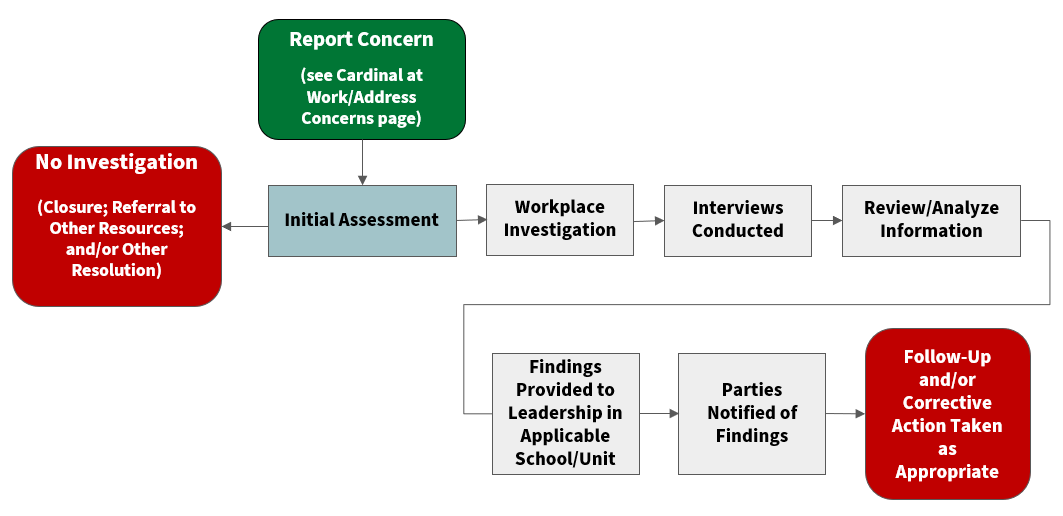Information About Participating in a Staff Workplace Investigation
The following information applies when a concern about the conduct of a staff member is reported and a staff workplace investigation is conducted. If the concerns relate to sexual harassment, a different process might apply.
The objective of a staff workplace investigation is to determine whether the facts alleged occurred. A staff workplace investigation is not a legal proceeding and there are no determinations as to whether law has been violated.
The university is committed to promptly and fairly investigating concerns, including those related to discrimination, harassment, and retaliation. The guideline for investigators to conclude a workplace investigation is 90 days. However, this timeline may be extended in some cases, such as complex matters or where there are unforeseen circumstances, such as the unavailability of parties or witnesses.
Process Flowchart
The following illustrates the general process of when a concern about the conduct of a staff member is reported.

View a text-only version of the workplace investigation flowchart
Participating in an Investigation Interview
You may be asked to participate in a staff workplace investigation interview after reporting your concerns. During the interview, you will have an opportunity to discuss your concerns in more detail. You may also be asked to participate in a staff workplace investigation interview if concerns have been reported regarding your conduct or if have been identified as possibly having relevant information to the fact gathering process. The investigation may be conducted in person or via video conferencing depending on the circumstances.
Please note the following guidelines:
- Confidentiality: The investigation is confidential and information regarding the investigation will only be provided on a “need to know” basis. This means that only people with the need or right to know will be given information about the investigation. The university will attempt to maintain confidentiality, but complete confidentiality cannot be guaranteed.
- Honesty and Cooperation: AGM 1.1.1: University Code of Conduct establishes the expectation that all members of the university community will cooperate in investigations, which includes answering questions honestly and accurately. Being dishonest during the investigation process can lead to corrective action.
- Impartiality: The investigation will be conducted by a neutral investigator and the investigator’s findings will be based on objective weighing of the evidence. No conclusions will be reached until the investigation is complete.
- Role of the Investigator: The role of the investigator is that of a fact-finder. The investigator will provide their findings to leadership within the applicable school or unit at the conclusion of the investigation.
- Standard of Review: The investigator will make findings using a “preponderance of the evidence” standard, which means the investigator will determine whether the facts alleged were “more likely than not” to have occurred.
- Written Report: To protect the confidentiality of the process, neither the parties nor witnesses to the investigation receive a copy of the report.
- No Recording: Recording of the investigation interview of any kind is not permitted except under very limited circumstances.
- Third Parties: The attendance of a third party or support person to accompany you during the interview is not permitted. Please note that bargaining unit employees should refer to their applicable Collective Bargaining Agreement.
- Breaks: You will have the opportunity to request breaks during the interview.
- Witnesses: You will have an opportunity to identify anyone you think might have relevant information. However, the decision as to who to interview is up to the investigator.
- Supplemental Information: If you are interviewed during an investigation, you will have the opportunity to provide documents and other supplemental information to the investigator to review during and/or after the interview.
Protections Against Retaliation
It is important that people feel comfortable raising concerns and cooperating in investigations, and the university has policies that protect individuals who in good faith report or provide information during an investigation. Retaliation violates Stanford’s policies. Please see Administrative Guide Memo: 1.1.2: Non-Retaliation Policy.